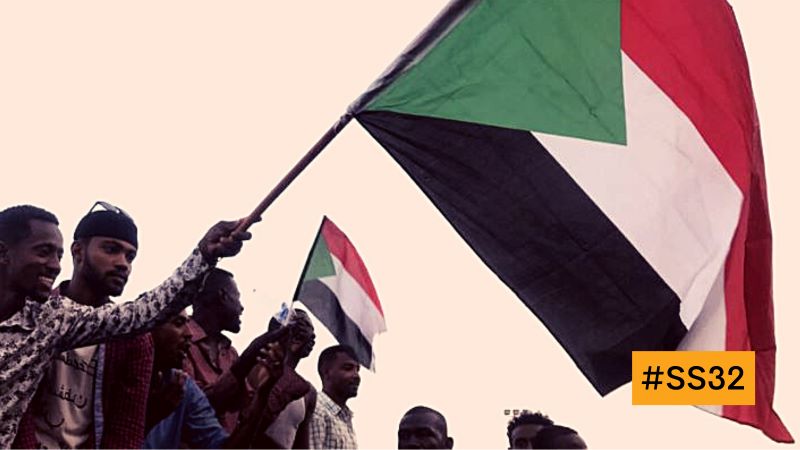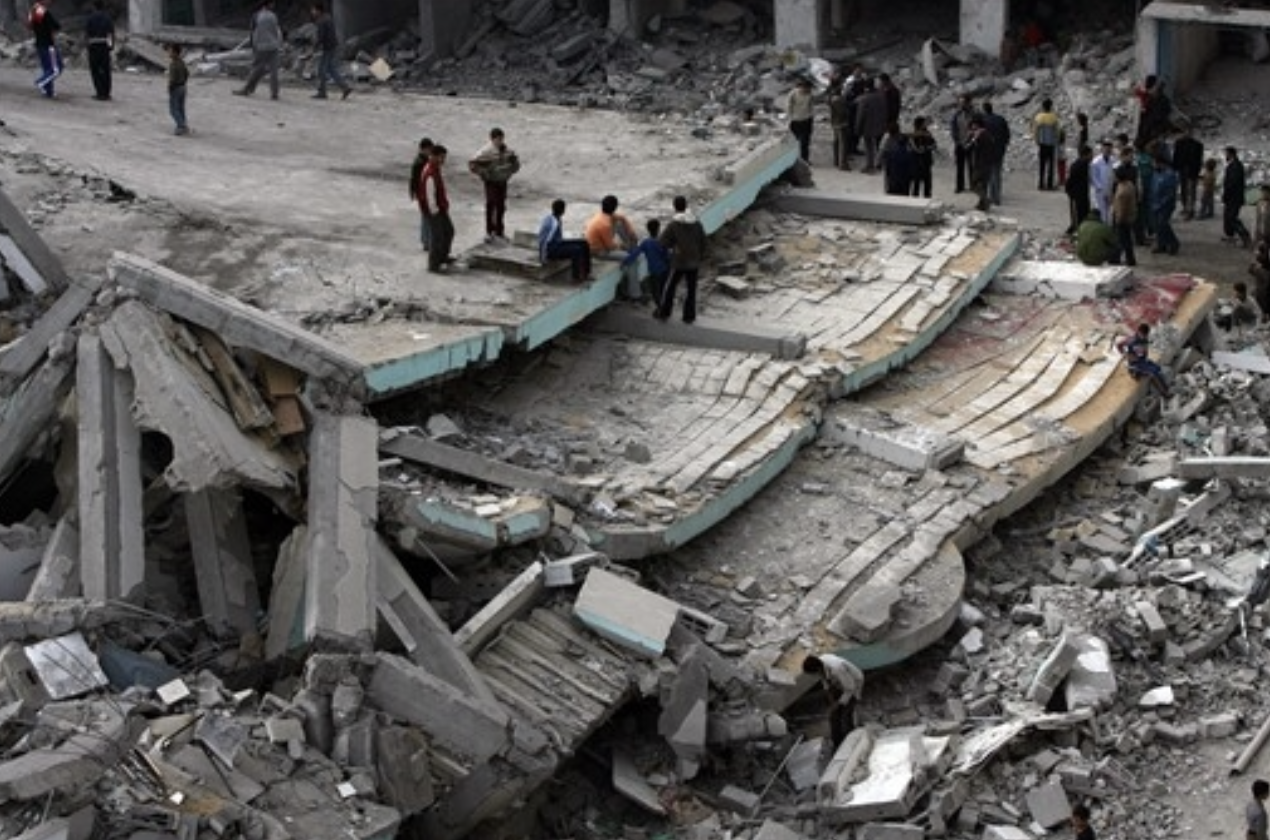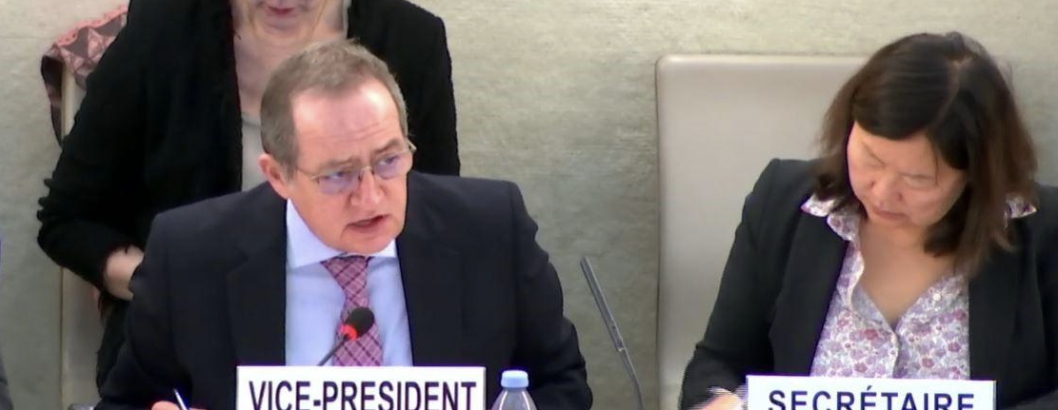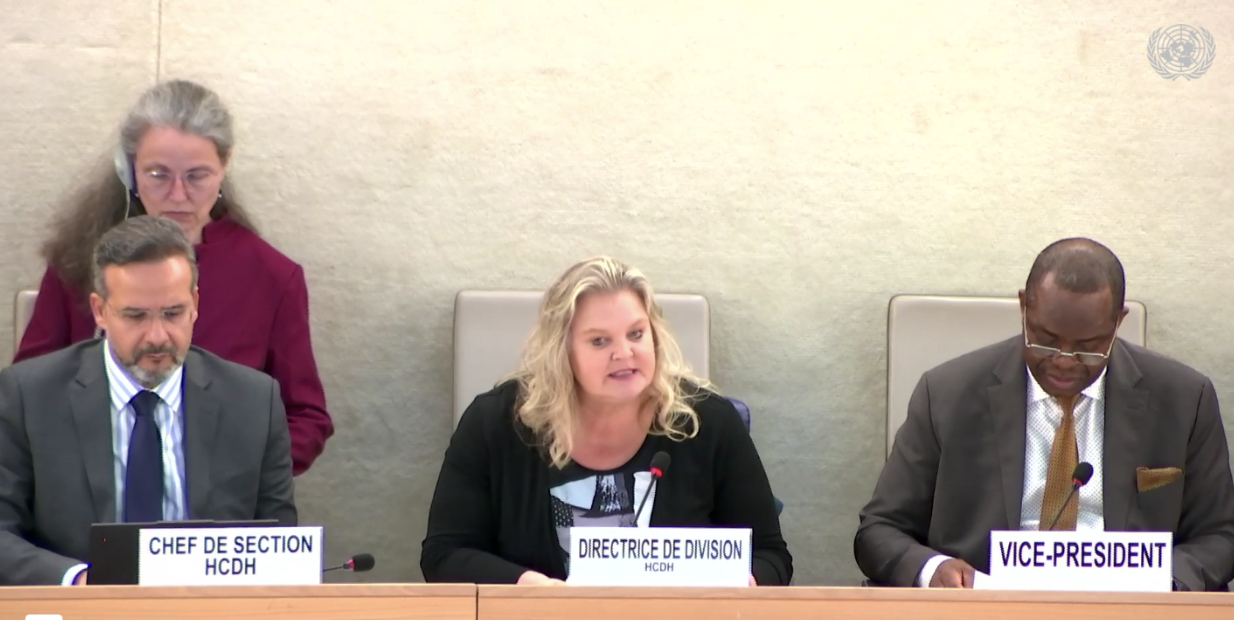By Louise Requin / GICJ
On October 25th, the Sudanese army took over the joint civilian led government in a military coup. The government had been assuring the transition from the authoritarian government of Al Bashir, ousted in civilian uprisings of 2019. Against the provisions of the 2020 Juba Peace Agreement and the 2019 Constitution, the military took over power, cut off communications and repressed protestors.

A letter, submitted jointly by the permanent representative of the UK and co signed by several states, asked the president of the Human Rights Council to hold a special session to address the human rights implications of the ongoing situation in the Sudan. The first meeting of the 32nd special session was held on November 5th, 2021. The second meeting led to the institution of a Special Rapporteur on Human Rights in Sudan for a period of one year to report to the Human Rights Council.
The High Commissioner for Human rights Michelle Bachelet opened the session with a presentation of the situation in Sudan. Since October 25th, protestors have taken to the streets and have faced violent response from the security forces. The OHCHR received communications on live ammunition fired on protestors, which has caused at least 13 deaths so far. All internet, radio and TV communications have been cut off, to the exception of the national channels. Newspapers have stopped printing. These conditions are in direct violation of the rights to peaceful assembly, to association and to free expression.
The Security forces have been reported to make excessive and disproportionate use of force, as well as targeting schools, journalists and activists. The prime minister and cabinet members are still held in detention in an undisclosed location, and their condition remains unknown.
The military takeover has unleashed violence against women. According to the head of special procedures, the women who led the protests in 2019 were not included in the political negotiation that ensued, a situation that might repeat itself. The current uprisings are lead by the Sudanese Professional Association and the Resistance Committee, the same groups that were at the forefront of the uprising in 2019.
In the discussion, most delegations expressed their support for the special session and strongly condemned the military coup. The group of African States, the EU, eastern European countries called for the immediate restoration of civilian rule and the release of the detained cabinet members, journalists and activists. Emphasis was put on Sudan’s recent history of authoritarianism, and its fragile democratic transition. Several Western delegations deplored the military takeover as it threatens the progress Sudan had been making toward transitional justice, peace and security.
The Arab Group and the Gulf Cooperation Council pointed that instability in Sudan threatens the region and all Arab countries. Therefore they stressed the importance of prioritizing the interest of the state, by adopting a cooperative position to solve the crisis and return to normality.
Several member states and observer states including Canada, Lichtenstein, the Netherlands and others called for the reinstitution of an independent investigation by the Human Rights Council. Civil society organizations deplored the premature end of the mandate of the Independent Expert in October 2020, which they argue left the Sudanese army unchecked. They therefore called fort the immediate appointment of an independent investigation into the human rights situation in Sudan.
Other countries, including the UAE, Costa Rica, South Africa and Ecuador suggested the support for a national dialogue, with the creation of a forum designed for the interested parties in the country. South Sudan supported the initiative, arguing that time was necessary for the people of Sudan to bring forward their interests, and that they should be allowed to articulate them before international intervention.
The second meeting held a vote on the draft resolution L.1 on the Situation of Human Rights in the Sudan, adopted 24 against 12. The UK delegate presented the resolution. It expresses concern for the situation in Sudan, condemning the military takeover and the detention of government members. The resolution calls for the immediate restoration of civilian rule and for the establishment of dialogue between the Sudanese military and the Sudanese civilian interests led by their Prime Minister Hamdock. The resolution allows for the HRC to designate a Special Rapporteur on human rights in Sudan for a year, who will report to the 50th regular session. The resolution was opposed by the Russian Federation, Venezuela and China, who disassociated themselves from this initiative, arguing it constitutes a breach on non-intervention into domestic affairs of the Sudan.
Geneva International Center for Justice urges the Sudanese military to restore access to the internet and communications networks as they are an essential tool for the enactment of fundamental freedoms. Furthermore, GICJ believes that the Sudanese people’s resistance to the military take over shows its commitment to the democratic transition. We call for the release of the detained members of government, journalists and activists. Finally, we strongly support the Human Rights Council resolution to reinstate the independent expert on human rights in the Sudan.
Justice, Human rights, Geneva, geneva4justice, GICJ, Geneva International Centre For Justice












